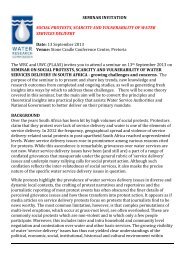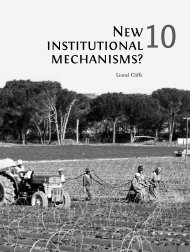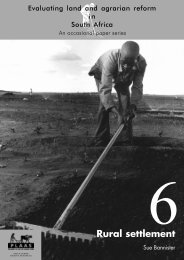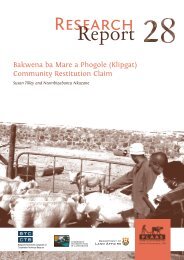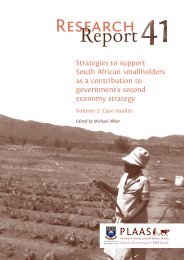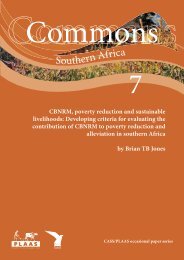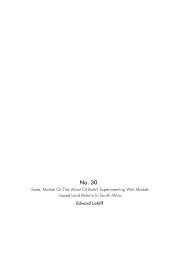You also want an ePaper? Increase the reach of your titles
YUMPU automatically turns print PDFs into web optimized ePapers that Google loves.
Critical scholarshipneeds to be selfcritical;both vigour andrigour are required forinformed public debatePOLICY ENGAGEMENTThe university’s mission statement commits it to ‘responding in critical and creative ways to the needsof a society in transition’, and to ‘helping build an equitable and dynamic society’. Is this kind of publicengagement at odds with the traditional emphasis at universities on teaching, learning and researchundertaken within a spirit of scientific enquiry? In our view it is not, but we do recognise the tension betweenthe two stances. We are committed to rigorous, independent and open-minded research, to debate andpotential disagreement amongst ourselves, and to admitting the possibility of error or mistaken judgementin both research and policy advocacy. Critical scholarship needs to be self-critical; both vigour and rigour arerequired for informed public debate.<strong>PLAAS</strong> researchers have engaged with policy processes since 1995, in a variety of different ways. They haveworked closely with various government departments, as advisors at national, provincial and local level,as consultants in the design or facilitation of programmes or projects, as reviewers or evaluators, and asfacilitators of policy workshops. Researchers have often been asked to present their views to the variousportfolio committees of Parliament.<strong>PLAAS</strong> researchers have also provided critiques of different policies, published articles and academicpapers, participated in public debates, and made presentations at policy workshops and conferences. Inrecent years staff members have been active within a number of emerging civil society alliances in the landand agrarian reform sector, and have sought to contribute to deepening the understanding of key policyissues by members of NGOs and community-based organisations. <strong>PLAAS</strong> researchers have been activein the following policy debates: land restitution, land redistribution, land tenure reform, land reform andenvironmental concerns, the Wild Coast Spatial Development Initiative, agricultural policy, minimum wagesfor farm workers, community-based natural resource management, communal rangeland management,forestry policy, traditional leaders and local government reform, subsistence and artisanal fisheries policy,co-management of marine and coastal resources, poverty reduction, food security and ethical trade in thewine and fruit industries.Dissemination ofresearch findings tothose who can makeeffective use of them isvitally important for anapplied research unitExamples include Andries du Toit’s co-ordination of a Ministerial Review of the restitution programme in1998, Ben Cousins’ contributions to formulation of tenure reform policy between 1996 and 1999, ThembelaKepe’s advice on implementation of the Wild Coast Spatial Development Initiative in 1997/98, and LungisileNtsebeza’s submissions on policies on traditional leaders and local government. Stephen Turner led a teamadvising government on policies for integrating environmental issues into land reform in 1996/97, and a teamthat evaluated donor support for the land reform programme, in 1998.Munyaradzi Saruchera and Ben Cousins helped draft the Lagos Declaration on Land and Resource Rights inAfrica, which was presented at the World Summit for Sustainable Development in 2002. Between 2002 and2003, <strong>PLAAS</strong> researchers and the National Land Committee facilitated a process of community consultationon the Communal Land Rights Bill, which culminated in community submissions during parliamentaryhearings. Edward Lahiff, Ruth Hall and Peter Jacobs have contributed to the People’s Budget since 2003.Andries du Toit and Cobus de Swardt assisted in the formulation of Western Cape provincial food securitypolicies in 2003 and 2004.The legal arena has been another important context for policy engagement. <strong>PLAAS</strong> was an amicus curiae inthe Modderklip case initiated in 2003, and individual researchers have presented evidence in support of legalaction by communities (e.g. on housing or fisheries management). <strong>PLAAS</strong> researchers have also presentedtheir views in hearings called by the Human Rights Commission (e.g. on conditions on commercial farms),and in a popular tribunal on land policy organised by the Trust for Community Outreach and Education.PUBLICATIONSDissemination of research findings to those who can make effective use of them is vitally important for anapplied research unit, and publications are a key output. <strong>PLAAS</strong> publishes books, conference proceedings,research reports, occasional papers, policy briefs, newsletters and information bulletins. Some are publishedin collaboration with partners such as the Institute of Development Studies at the University of Sussex, theOverseas Development Institute in London, Noragric at the Norwegian University of Life Sciences, and theChronic Poverty Research Centre at the University of Manchester, and this helps to ensure a wide audience.4




